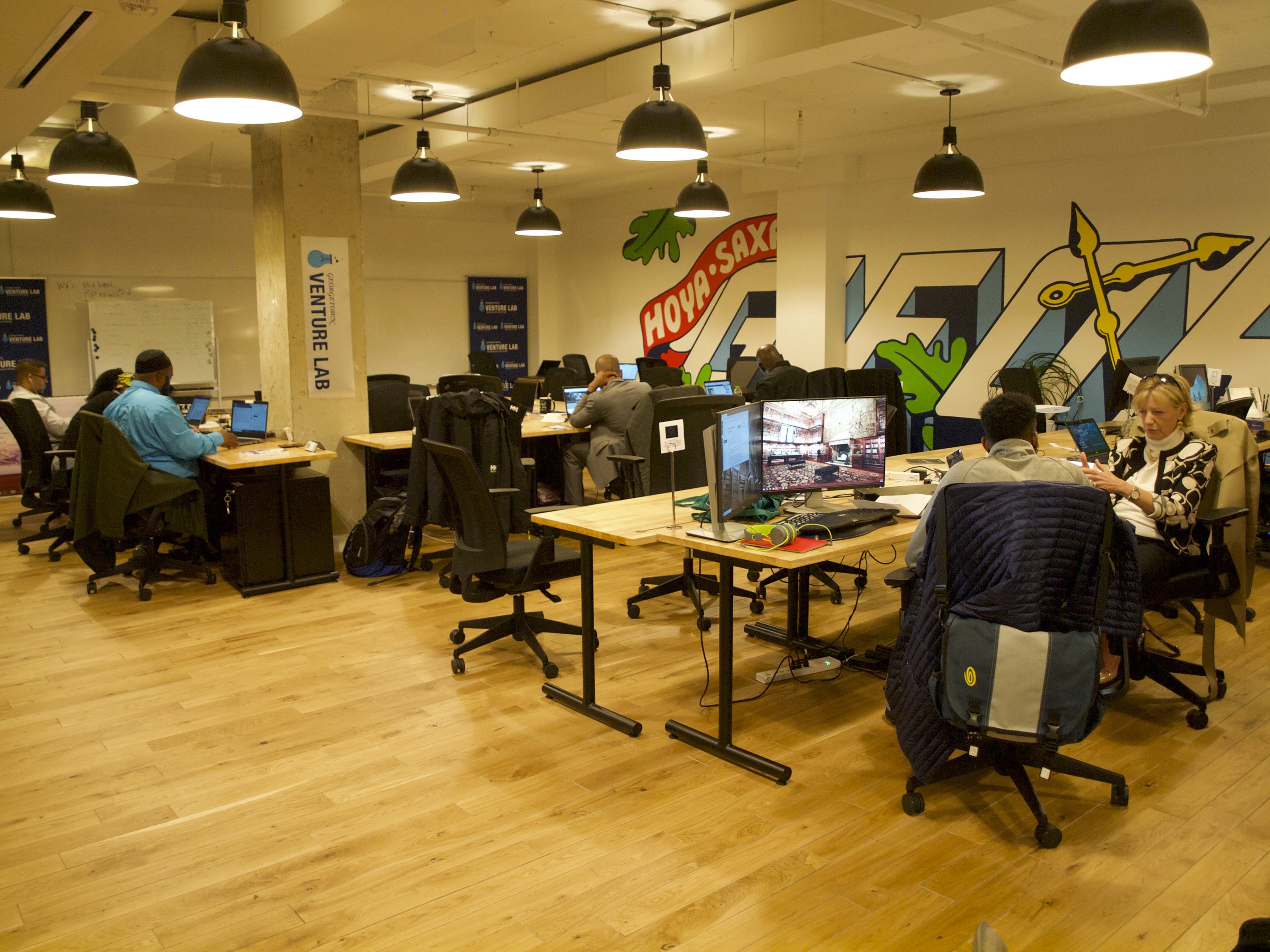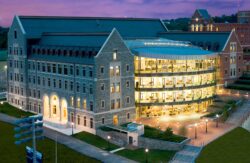When DeVaughn Bell was admitted into the Georgetown Pivot Program, he posted a picture of his Georgetown ID alongside his prison ID on social media. His family and friends, he said, could not believe that he had gotten into Georgetown. Bell smiled as he told the story—he was proud of how far he had come in a year.
“It was one of my milestones,” said Bell, a fellow in the Pivot Program’s inaugural class.
The Pivot Program is a non-credit-bearing certificate in business and entrepreneurship which assists 20 D.C.-area residents who have been released from prison in the past two years with their reentry into society. The program is a collaboration between Georgetown’s Prisons and Justice Initiative (PJI), the McDonough School of Business (MSB), and the Georgetown College. It is housed in the Georgetown Venture Lab at WeWork’s G Street location. Fellows take business courses focused on entrepreneurship, as well as liberal arts courses to broaden their thinking. They also participate in internships with local businesses.
Marc Howard, director of PJI and co-director of the Pivot Program, first came up with the idea for the program in the spring of 2016. Howard, a government professor at Georgetown, had a meeting on his calendar with a wealthy philanthropist and worked with the Georgetown Office of Advancement to formulate a plan should a funding opportunity present itself. The meeting was not fruitful, and Howard filed away his idea, at that point called “Stay Out and Succeed.”
Then, two years later, Pietra Rivoli, vice dean of the MSB, approached him to explore how the business school could contribute to PJI’s work. Between February 2018, when Rivoli and Howard initially met, and the onboarding of the cohort’s first fellows in November 2018, the co-directors secured a team of dedicated instructors and staff. The complete cohort of fellows began taking classes together at WeWork this January.
Rivoli said the Pivot Program team sought out candidates with a certain level of academic readiness and the maturity to stick with a year-long program, but that the desired qualities the team looked for in applicants for the program were no different than those the admissions committee looks for with any other business school program.
“We looked for people who had a clear image of themselves—that they would be in a different place in five years time than they were today, even if they couldn’t exactly tell you how they were going to get there,” said Alyssa Lovegrove, academic director of the Pivot Program.
Four of this year’s fellows came from another of PJI’s programs, the Georgetown Prison Scholars Program at the D.C. Jail, which provides incarcerated citizens the opportunity to take courses and attend lectures within the humanities and social science fields. The remainder found the program through various avenues such as the Mayor’s Office on Returning Citizens Affairs (MORCA), the Department of Employment Services (DOES), and the Free Minds Book Club, which uses reading and creative writing to empower incarcerated and formerly incarcerated youth and adults. Judge Jorge Vila, a magistrate judge on the D.C. Superior Court, also put the program in contact with several of this year’s fellows.
The Pivot Program is needed, Howard said, because of how difficult the United States—where 70 million people have some kind of a criminal record—makes it for incarcerated people to rejoin society. “We make it very hard for them to get back on their feet, to be able to do basic things, like to vote, to get a job, to get housing,” Howard said.
Last year, the unemployment rate for returning citizens throughout the United States was 27 percent. Even if you have a GED or a diploma, it can be difficult to get hired.
“People don’t trust returning citizens,” Joshua Miller, the program’s managing director and a philosophy professor at Georgetown, said. “We live in a country where we incarcerate more people than anywhere else, and that means that a lot of people who are great workers, who have a lot to add to a team or to a firm, are excluded just because of this record.”
Bell experienced the frustration of trying to get a job after prison firsthand. He was released in mid-February of 2017, and by March he had received three job offers only for the prospective employers to rescind them when he failed their background checks.
“On paper, I look really good until they run through the background screening,” Bell said. “So that was kind of discouraging.”
In 2014, D.C. passed the Fair Criminal Record Screening Act, better known as “Ban the Box,” in reference to the checkbox that appears on applications asking if an applicant has a criminal record. The law prohibits employers from asking about an applicant’s criminal record before making a conditional offer of employment. Employers can still rescind an offer if a background check reveals a criminal conviction related to job duties. In recent years, 34 states, D.C., and over 150 cities and counties have passed “Ban the Box” policies.
Howard argues that even with this protection, returning citizens still face hurdles to employment. “People can find out very quickly, employers can find out, anyone that does Google searches can find out,” he said.
Lovegrove said employers often do not take the time to understand all the factors that impact whether a formerly incarcerated person is a suitable candidate for a job.
“Do they come from a stable home life? Are they connected to other people in their community? Are they secure?” Lovegrove said, “There’s just a lot of things that can help you judge whether somebody is vulnerable or not, and employers, they’re just looking at a paper that says you’re convicted of a crime.”
Though not publicized on the Pivot Program’s website as the principal goal, Lovegrove said an objective is facilitating engagement between employers and returning citizens, in addition to providing work experience for the fellows. “Anyone who has actually worked with a formerly incarcerated individual is changed by it. So part of what we are trying to do is essentially get people to give it a shot in a low risk way.”
She described an upcoming networking event the Pivot Program has scheduled for early May to engage current and prospective employers with the program. The event will allow representatives from local businesses to talk with the fellows, hear about what they have gained from their courses and internships, and learn what they feel they’re now capable of contributing to the workforce.
“It’s the best marketing tool we have,” Lovegrove said. “Our job is simply to get people to turn up and fall for them.”
Miller said one of the program’s larger goals is changing the narrative around returning citizens. “We want people to understand that they’re a massive untapped resource and not something to be afraid of. Not just that they deserve a second chance, but that you’re missing out if you don’t have returning citizens on your staff.”
As the fellows are learning to start their own businesses, Lovegrove said, it’s important they understand the foundational elements of a commercial enterprise, such as strategy, marketing, profit, and loss. But Lovegrove believes the entrepreneurship curriculum is rooted in solving problems.
“We spend a lot of time looking at problems rather than solutions because fundamentally that’s what entrepreneurs do. They don’t start off with what they want to sell, but what’s the capability they’re trying to build,” she said.
In his initial meetings with Rivoli, Howard said, they agreed the Pivot Program would include liberal arts classes in addition to business courses. “I believe strongly that the liberal arts, while they might not be measured as well in terms of direct impact on salaries and clear economic measures, help to create well-rounded people who are prepared to deal with the challenges of life,” Howard said.
The fellows are studying subjects such as literature, economics, psychology, history, and philosophy. The primary aim of the liberal arts curriculum is to build critical thinking and problem-solving skills—both essential to the business world. “All business people fundamentally are problem solvers,” Lovegrove said. ”You need to get comfortable looking at a situation where there isn’t necessarily a single right answer, where you have to gather a lot of information, make the ambiguousness make sense.”
Olayemi Oladiji, one of this year’s fellows, says the curriculum has helped her feel more confident in her abilities. “I always prided myself on being a problem solver, but sometimes I get overwhelmed when I see the problem,” Oladiji said. “Now I feel a little more secure when I see a problem.”
The Pivot Program also teaches the fellows practical skills that are vital for the workplace. According to Lovegrove, many of the fellows came to the program without much experience with computers and smartphones. In the program, fellows learn to handle large projects by sticking to deadlines and setting goals.
The fellows are picking up some of these skills in their internships with local businesses, which they began earlier this year.
Oladiji reflected on the what she had learned about teamwork and completing a project incrementally through her internship with Northern Real Estate Urban Ventures, a real estate developer and advisory practice.
“It makes me realize that having a team is essential to any business,” Oladiji said. “Basically we all work together to get this checklist done. It helps me go through task by task.”
Internships have also contributed to the fellows’ long-term goals. Bell has been working at Prequel, a restaurant incubator space in downtown D.C. He hopes to go into the catering business and eventually open a food truck. He has worked in management roles at Taco Bell and KFC restaurants but said his work at Prequel has given him a new perspective into what goes into owning a business.
“I’m actually doing the owner’s things versus just being in a manager position,” Bell said. “For me that’s the biggest take-away, to get that look at it from the owner’s perspective.”
When classes end in June, fellows will opt to either continue working in an internship as a step toward permanent employment or enter a venture incubation period in which they will be provided with work space and given access to legal counsel and business coaching.
Lovegrove anticipates most of them will likely seek employment while also working on business ventures of their own.
“I think almost all of them have an entrepreneurial instinct and a desire to create something of their own, but I think most of them realize that they probably need more experience, more skills, and more social capital before they can really succeed with their own venture,” Lovegrove said.
Regardless of whether they start their own businesses, Miller feels the entrepreneurial skills the fellows have learned in the program will serve them in many parts of their lives.
“They’re treating their lives, their housing situations, any job they find themselves in as an entrepreneurial venture, as something that is about risk and reward, as something that requires them to think beyond what they’re offered and change the playing field that they find themselves on,” Miller said.
For Oladiji, a difficult job search helped inspire her to think about starting her own business. “It’s motivated me to find creative ways of making money and trying to be stable because times got really rough trying to look for a job.”
According to Miller, one of the biggest milestones in the Pivot Program’s story was when the deputy director of the DOES, Charles Jones, agreed to provide stipends for each of the fellows during their internships. The Pivot Program is supported by MORCA and the D.C. Department of Small and Local Business Development. It also received a $400,000 grant from the Minority Business Development Agency, which is a part of the federal Department of Commerce.
Bell said that D.C. is a pioneer in providing opportunities for returning citizens, and often finds people he was in prison with wondering why their cities don’t offer the same resources. “I talk to a lot of guys that I was in with from different cities, and when I tell them what I’m doing, they say, ‘How can we get these programs in our cities?’”
Mayor Bowser, as part of her proposed budget, plans to continue funding Project Empowerment, a DOES program that aims to lower barriers to employment, including those posed by a job seeker’s former incarceration. MORCA supports returning citizens by partnering with D.C. departments such as the Department of Small and Local Business Development which operates Aspire to Entrepreneurship. This program supports D.C. residents who are on parole, probation, or re-entering society and who own or are looking to start their own businesses. In February, the Bowser administration opened the READY (Resources to Empower and Develop You) Center which provides housing, employment, healthcare, and education resources for formerly incarcerated D.C. residents.
And Lovegrove views the Pivot Program as another way to tap into the abilities of returning citizens and help their communities thrive.
“We have a permanent underclass, and the way out of that is by creating employment opportunities for them,” Lovegrove said. “As business leaders, we owe it to the community to take something like this that is ugly and difficult and hard to do, but do it anyway and create a model that others can follow.”
Howard believes the Pivot Program is lucky to be in a city that recognizes the obligation to support returning citizens in their entrepreneurial and employment endeavors, and places it within broader efforts to address the effects of mass incarceration. To Howard, the Pivot Program is not alone in its work. “We’re part of a larger movement, which is to restore human rights to people.”






